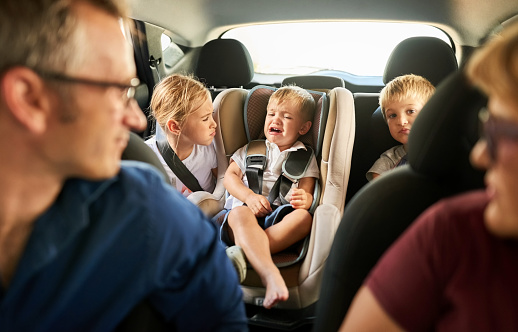
Last week we went on holiday with friends for the first time and, the day before leaving, the four adults exchanged a flurry of messages, the gist being: ‘‘please don’t judge our parenting lol’’.
I had terrible visions of turning, mid-scream about bedtime, to see our hosts googling social services, of them discreetly testing my youngest’s blood sugar after his third, maybe fourth ice cream. Luckily, they were having the same worries. Could I promise not to write a column about it, at least? Unfortunately, friends, there is much to say.
Current parenting philosophies revolve around a certain mindfulness. The parent must decipher and understand the reasons behind their child’s ‘‘dysregulated’’ (previously: naughty) behaviour, and instead of correcting that behaviour, acknowledge and narrate the complicated feelings the child is feeling.
Instead of, ‘‘Get into bed immediately, it’s been two hours, I am going to lose my shit,’’ you kneel down on the carpet and talk to your child gently in order to understand why they’re reluctant to get into the nice soft bed that you would kill to lie down in for just one second, to just close your eyes for one ...
The child learns to understand and control their emotions partly because the parent is narrating and affirming them daily (‘‘You’re kicking your sister because you feel ignored’’), and partly because the parent is keeping calm themself. Dead, dead calm.
While previous parenting advice tended to focus on controlling the behaviour of the child, the modern version focuses on controlling the behaviour of the parent. And much of it is sensible and useful and good - I’m often grateful for the internal reminder to simply, for example, take a breath, and consider how I talk to my children. It reflects intentions in other corners of our lives, where we’re all working to be respectful and empathic - it feels natural to extend this to our children, even to whether adding sauce to spaghetti makes ‘‘dirty pasta’’.
But, spend a little time with parents today, and you will notice a grim set to their smile, a vibrating knee. When the children are finally asleep and they have limped back downstairs, they will wonder, in a shaky voice, whether maybe sometimes, instead of calmly unpicking a child’s psyche on the bathroom floor, a kid just needs to brush their bastard teeth?
My issues with parenting advice are centred around the lie that there could ever be one way to raise a million different children with a million different parents. And that sometimes the shame and pain of feeling one has failed the parenting test can be equal to, if not worse than, the frustration of parenting itself.
Discussing all this with a friend who swears by parenting books, it occurred to me that it might be nothing to do with parenting at all, but is instead grounded in my own experiences of pain. You see, I’ve had crippling migraines since my teens, resulting eventually in a kind of stroke and the permanent loss of sight in half an eye (right), and, despite doctors’ appointments over decades, very little has worked. There was no straightforward fix. And so I came to believe quite strongly in the magical art of muddling through: accepting discomfort, doing one’s best and appreciating the painless moments.
The parenting advice industry promises, in contrast, that if you follow its methods the discomfort of parenting will cease to be. Could that be true? And is the anxiety, the conflict, the exhaustion and woe as key to the relationship as the love, the joy, the laughter - is it entangled within it, in fact, one reflecting the other?
This business trades off our enduring inability to accept ... ambivalence. While my parent friends and I continue to try to be calm and gentle, and (crucially) lovely, if I return to the literature, I’m struck by how the parent figure in these equations is empty, no - hollowed out. Long after giving birth, she remains a vessel, without judgement, pain, work, without a ticking clock - she’s the mother, and that’s it.
Since having children I’ve been a sort of holiday sceptic - the problem always seems to be that wherever we go, there we are, the same jollities, the same sibling squabbles, the same flawed family.
But last week we had, somehow, a gorgeous time - all the children, strangers to each other until we arrived, quickly became best friends, and the adults, having worried we’d expose the depth of our inadequacies after a single tricky kids’ bath time, discovered we were all trying and failing at parenting in acceptable, even complementary ways.
Some grace was offered, some relief. I’ve long given up on perfection - the dream, formalised on the way home, is to raise decent children, but without losing myself along the way.
- The Observer













